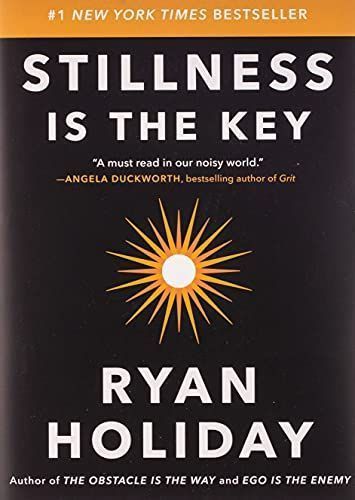
Stillness is the Key An Ancient Strategy for Modern Life
Instant #1 New York Times Bestseller & Wall Street Journal Bestseller 'Whether you are an athlete, an investor, a writer or an entrepreneur, this little but soulful book will open the door to a healthier, less anxious and more productive life and career.' - Arianna Huffington 'Ryan's trilogy of The Obstacle is the Way, Ego is the Enemy and Stillness is the Key are for sure must-reads.' Manu Ginobili, 4x NBA champion and Olympic Gold Medalist Throughout history, there's been one indelible quality that great leaders, makers, artists and fighters have shared. The Zen Buddhists described it as inner peace, the Stoics called it ataraxia and Ryan Holiday calls it stillness: the ability to be steady, focused and calm in a constantly busy world. This quality, valued by every major school of thought from Buddha to Seneca, John Stuart Mill to Nietzsche, is urgently necessary today. And, Holiday shows, it is entirely attainable. Just as Winston Churchill used bricklaying as a time to recharge and reflect, or Oprah Winfrey learned deep empathy from her quiet childhood, we can all benefit from stillness to feed into our greater ambitions - whether winning a battle, building a business, or simply finding happiness, peace and self-direction. Filled with wisdom and examples from historical and contemporary figures, this book shows how to cultivate this quality in your own life. Because stillness is not merely inactivity, but the doorway to the self-mastery, discipline and focus necessary to succeed in this competitive, noisy world.
Reviews
Christian Bager Bach Houmann@cbbh
Brooke Lonegan@beetle
benja@benjavk
Heiki Riesenkampf@hrk
Mert@mertb
rumbledethumps@rumbledethumps
Nick Gracilla@ngracilla
Julien Sobczak@julien-sobczak
Kuba Milcarz@kubamilcarz
annie@annieswan
Benjamin Harrison@c0nsilience
Anish Ravipati@anishrav
Jeremy Anderberg@jeremyanderberg
Ivaylo Durmonski@durmonski
Kevin S Perrine@kevinsperrine
Brandon Lee@sangsara
Clint Bedwell@clintbedwell
Courtney@courtacademia
Veerendranath@veererendra
Allison Ball@itsalliball
Caroline Schmauch@carolineschmauch
Gerbert-Jan@gjrosmalen
Mina@minabookworm
Colton Ray@coltonmray